'The Good Place,' a sitcom about ethics in the age of Trump, heads for TV heaven
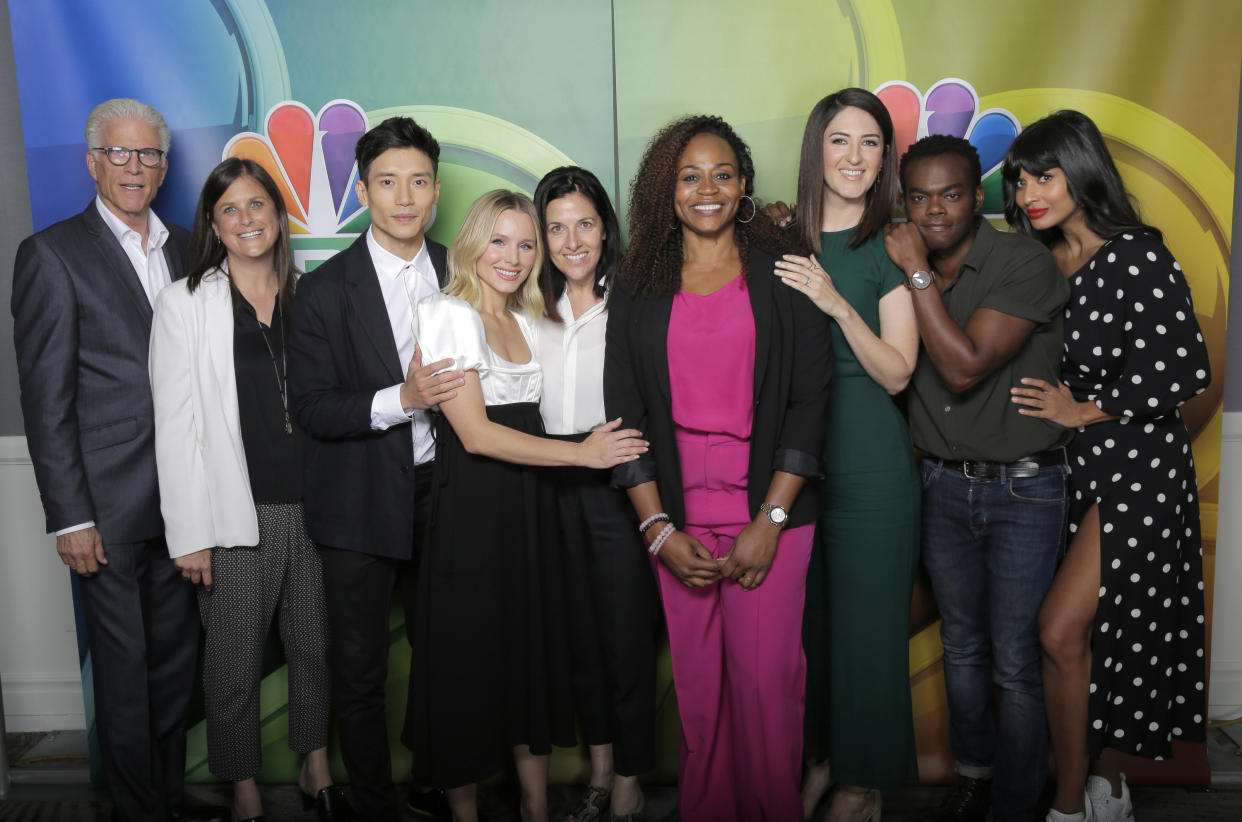
SOUTH BEND, Ind. — It’s a Monday morning at the start of the academic year at the University of Notre Dame, and a freshman is asking a lecturer about the Trolley Problem, a well-known exercise in practical ethics. A runaway train is about to hit five track workers. You can let them die by doing nothing, or you can switch the train to a different track with just a single worker on it. You would save five lives, but the one fatality would be the direct result of your actions. What would you do?
The dilemma has been posed in philosophy classes for generations, but the guest lecturer here at Notre Dame isn’t a professor. He’s a comedy writer. Michael Schur is the creator and showrunner of “The Good Place,” a show entering its final season having gone where no network sitcom has gone before — the realm of moral philosophy.
Schur is the guest lecturer at Meghan Sullivan’s God and the Good Life class, a program she created to make philosophy less about remembering who was Kierkegaard and who was Nietzsche, and more a tool for decision making in everyday life. Sullivan began teaching the class in the fall of 2016, around the same time “The Good Place” debuted, asking many of the same question about how to live a good — in the moral sense — life. The student was asking Schur about the Trolley Problem because a second-season episode was devoted to it, winding through increasingly absurd variations — would you kill five William Shakespeares to save one Santa Claus? — with bloody and hilarious results.
When Sullivan first watched the show, she was pleasantly surprised to see an NBC sitcom explain utilitarianism, the principle that the best course of action is whatever brings the most good to the most people. The fact that the “The Good Place” not only was aired by a major network but is about to begin a fourth season seems to her like a minor miracle.
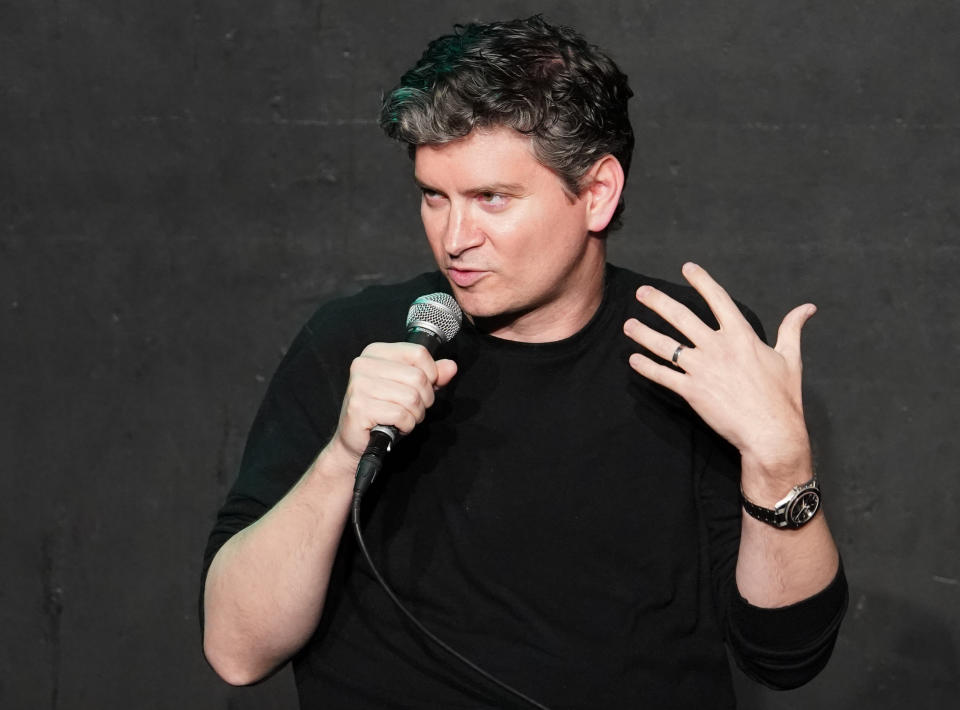
Schur, who is 43, has had a brilliant career in comedy, along the well-trod path from the Harvard Lampoon to “Saturday Night Live” and then “The Office,” before creating “Parks and Recreation” and “Brooklyn 99.” In 2016, NBC Entertainment offered him the rare opportunity to create 13 episodes of any series he’d like. Wanting to be remembered as something more than the father of the modern workplace sitcom, he took an unconventional approach, pitching a show about what it means to be a good person, and that would include scenes of a character standing at a chalkboard teaching philosophy.
But he also promised the network execs that it wouldn’t come off as homework. What resulted from this process has been described fondly by one cast member as “the smartest, dumbest show on TV” — a sitcom whose writing room has relied on a small staff of “consulting philosophers.”
The premise of the series, whose pilot, Schur says, has been viewed over the years by 39 million people, could never be described as simple, but at the beginning it was easy enough to explain. Eleanor (played by Kristen Bell) dies and goes to heaven — the eponymous Good Place, designed and overseen by an immortal architect, Michael (Ted Danson). But she finds that her presence is a result of a clerical error and she was actually supposed to go to the Bad Place. She embarks on a quest for postmortem redemption, seeking guidance from Chidi (William Jackson Harper), a deceased professor of moral philosophy.
Along with Tahani, a name-dropping celebrity philanthropist played by Jameela Jamil, and Jason, a Florida DJ played by Manny Jacinto, Eleanor and Chidi find out — spoilers ahead — that their entire neighborhood is a ruse. The four of them are actually in the Bad Place, part of a pilot program put together by Michael (who is actually a demon) and based on French existentialist Jean-Paul Sartre’s play “No Exit” and his suggestion that “Hell is other people.”
What does it even mean to be good? Admission to the Good Place is based on a point system, where positive actions increase your total (15.02 for remembering your sister’s birthday) while negative actions will cost you (you lose 4,015.55 for poisoning a river). Accrue a high enough point total during your life on Earth and you enter the Good Place. But that system no longer functions in the modern world, in which every action has unintended consequences: give someone a rose and you are promoting pesticide use and the exploitation of Third World workers and greenhouse gas emissions, so you end up with a negative balance almost no matter what you do. As a result, they come to find that it’s been centuries since a human qualified for the Good Place.
With the system stacked against its characters, one of the show’s takeaways is, contra Sartre, that being a good person depends on your relationships with other people, or as summed up by the title of a real philosophical text and fictional lecture featured in the show, “What We Owe to Each Other.”
From the beginning, Schur steered the series away from religion. In the premiere, Michael explains to Eleanor that the major world religions got about 5 percent correct of how the afterlife functions. “It’s about versions of ethical behavior, not religious salvation,” Schur told the Hollywood Reporter in 2016, adding, “The show isn’t taking a side, the people who are there are from every country and religion.”
The show has touched a nerve in mainstream culture during a tumultuous time. Americans are questioning systems that have stood for centuries, as the interest in socialism as an alternative to capitalism grows and work like the 1619 Project by the New York Times examine the role of slavery in America’s founding. And they frequently conflate ethical stances with consumer choices and political acts, boycotting fitness company SoulCycle over one of the owner’s support of Trump or destroying their Nike gear because the company has a deal with Colin Kaepernick.
And the definition of ethics has expanded to cover issues as big as the entire ecosphere and as small and personal as “microaggressions” toward strangers. Pamela Hieronymi, a UCLA professor who has served as one of the consulting philosophers on “The Good Place,” has called the current moment “a cultural blamefest” in which people try to realign a society that has traditionally subjugated certain groups.
“With the #MeToo movement, it’s a moment of turmoil and people are coming to see that things have not been paid attention to and need to, ought to, I think, get more attention,” said Hieronymi. “At the same time, it’s inevitable that that can be taken too far ... especially when standards are changing and there’s a kind of transition, it’s going to be hard to figure out where that line should be drawn.”
And something else happened around the time that both “The Good Place” and Sullivan’s class debuted that brought ethical principles into sharp focus for Americans. “This show was conceived of in early 2016 and I wrote the pilot and we did a lot of the work on the first season before the presidential election of 2016,” said Schur. “I thought we were doing something that was completely abstract, that the idea of the show about how to be a good person through the lens of ethical behavior was just a piece of art floating in the universe. Then over the course of the next three-and-a-half years, the word ‘ethics’ has appeared on the front page of every major newspaper. … It’s been really interesting to make this show in this era. It did not set out to be any kind of commentary on the current political situation or current socioeconomic situation of America or anywhere else. It just happens to have weirdly dovetailed with national events. I mean, that’s not bad, I think that’s good.”
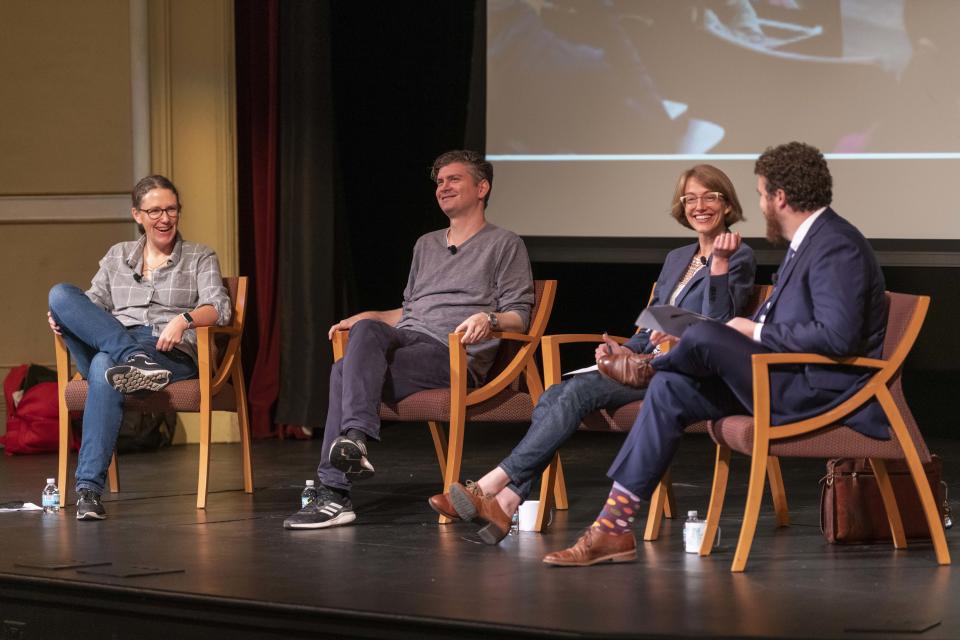
“We just stepped right into it, we had no idea what was going to happen or this new moral climate was going to emerge very suddenly,” said Sullivan, who scrapped her original lesson plan for the first class after the election and focused on conversations between her students. “We had a moment of … just stumbling blindly into this weird cultural moment of pretty high demand [for] certain kinds of discussions.”
Schur may not be exaggerating about the cultural salience of ethical issues. Former ethics lawyers from the George W. Bush and Obama administrations agreed that Trump’s first year was the most unethical ever for a presidency. Five Cabinet secretaries have left the current administration under suspicion of corruption. And Trump’s casual disregard of the boundaries between the national interest and his own political fortunes was the basis for the impeachment inquiry ordered by House Speaker Nancy Pelosi on Tuesday.
On the day before Trump’s inauguration in January 2017, the penultimate episode of the first season of “The Good Place” aired, with a flashback of Eleanor acting deplorably, set to Frank Sinatra’s version of “My Way,” which Schur considered “the ultimate tribute to selfishness.” The next day, Trump and his wife, Melania, had their first dance as president and first lady at the inaugural ball. They danced to “My Way.”
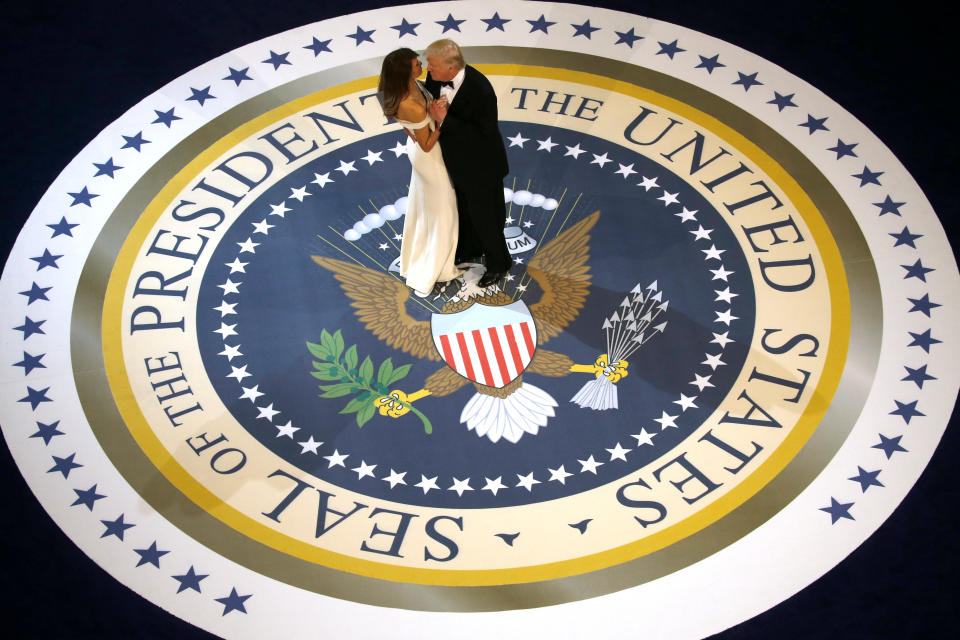
Todd May, a philosophy professor at Clemson University who has also consulted with Schur and whose book “Death: The Art of Living” was featured on the show, the current moment reveals the inadequacy of America’s legacy political institutions in the face of unprecedented corruption.
“On the one side you have these changing norms, harms that are being recognized that weren’t recognized before,” said May. “On the other hand, you have a political culture which seems to have no guard rails. So you have this strange clash between these new normative constraints that should have been longstanding but we’re just recognizing now and a political culture where anything goes as long as you win. That sets up a situation where everything looks like a battle and it becomes a war.”
May believes the show offers a potential antidote to polarization by both offering a moral model and reminding viewers that people are complicated, and redemption is possible. “It’s surely the case that there’s a much more polarized atmosphere, so what can you do? You can try to address it or try to create something positive that’s a model for people and I think that’s where ‘The Good Place’ goes, not to try to address the issues directly but to offer a kind of positive model for moral progress that people can relate to and might take them outside the polarization.”
To say “The Good Place” is just a show about explaining ethics in a digestible fashion or is simply a window into our current American moment would be to dismiss the myriad elements that make it so successful. Beyond Schur’s impressive pedigree including two Emmy Awards, you also have Danson, one of the greatest sitcom actors ever (dating back to his work as Sam Malone on “Cheers”), fully relishing the opportunity to work as a demon who breaks good, and Bell, whose redemptive journey is the heart of the show. Throw in a bunch of talented guest stars (Maya Rudolph, Adam Scott and Jason Mantzoukas, to name just a few) and a penchant for puns at every possible opportunity and there is a great deal to love.
Still, the core of the show is the question of how someone can actually be a good person. The series was such a success from its earliest episodes that Sullivan began incorporating it into her class more and more. This semester she teamed up with Christine Becker and Ricky Herbst from the university’s Film, Television and Theater Department to offer a special class for a small group of students: The Good Class, an interdisciplinary dive into the show that includes a “long lunch with Michael Schur” on its syllabus.
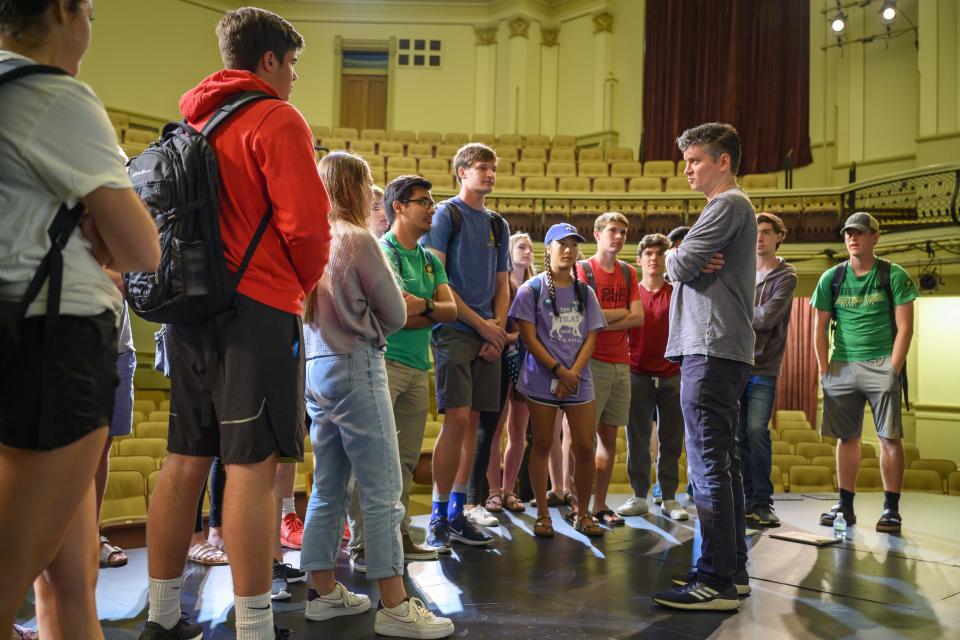
Sullivan believes the show subtly encourages people to have difficult discussions they might otherwise avoid, conversations “about what kind of community we want to live in or what kinds of things make it easy for us to judge other people.” It is a corrective against the temptation to give up and assume that nothing we do matters, what she calls “this problem of widespread moral nihilism. ‘Climate change will happen no matter what I do. The economy will immiserate people no matter what I do. I can’t have a personal vision of what it is to lead a good life because no matter [what] I’m going to have to fit it into a political party or some kind of system that seems to be created by something outside of me.’
“One of the biggest things that’s exciting about shows like this or having conversations like this is being able to raise the question to viewers or to students about whether we should accept that or whether or not we actually do have a lot of capacity to change things, or capacity to change ourselves.”
Schur agreed during his visit.
“Nihilism is to me is the looming specter of all of this stuff,” Schur said. “We kept nihilism looming under the surface of the show in every direction because that’s the trap you can fall into.”
The show and the class have both been hits. “The Good Place” has piled up numerous awards and nominations, and the high-concept gamble paid off for Schur, who earlier this year signed a deal keeping him with Universal Television reportedly worth more than $100 million over five years. In 2018, Sullivan received an $806,000 grant to help expand the class and adapt it as a curricular model for other universities. So far, 114 faculty members from over 100 schools across the world have joined the project.
The final season of “The Good Place,” which begins Thursday, will be informed by Schur’s immersion in 2,500 years of Western philosophy. He has rejected Kantian ethics, built on the rigid concept of the categorical imperative, and the idea he toyed with early in the series, of piling up credits for specific acts, in favor of a modified version of Aristotelian virtue ethics, where it matters more about who you are versus what you do, with your actions reflecting who you are. To Schur, the key action one can take to become a better person is consistently putting in the effort. But you have to accept that even if you’re trying to live a moral life, you are going to fail a lot of the time.
“The show’s position in the final season essentially becomes: What’s important isn’t whether you’re a good person or a bad person, it’s important that you’re trying to become a good person,” said Schur. “I think perhaps the most dangerous problem with life, especially in a Western industrialized nation like America in the year 2019, is complacency. Complacency comes very effortlessly. I have come to the sort of conclusion that that is what’s important: Putting in your brain that you have to try to be a good person every day prohibits you from becoming so complacent you forget that that’s a goal you should be considering.”
_____
Download the Yahoo News app to customize your experience.
Read more from Yahoo News:



